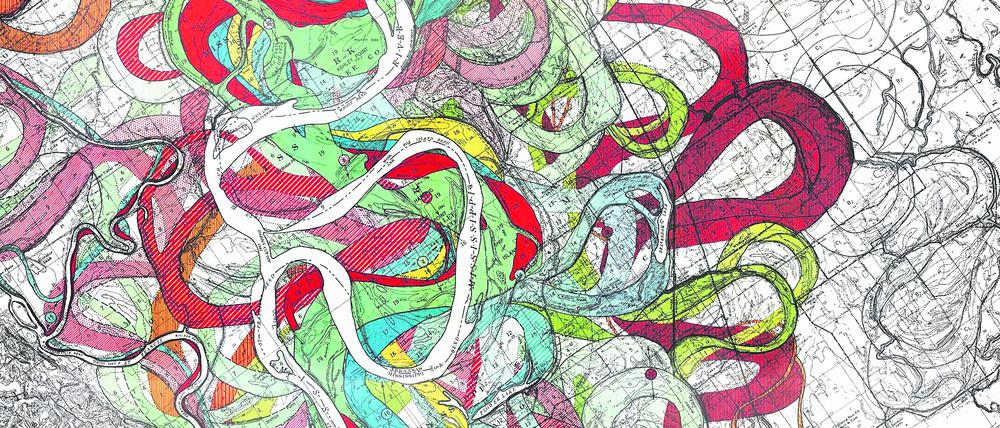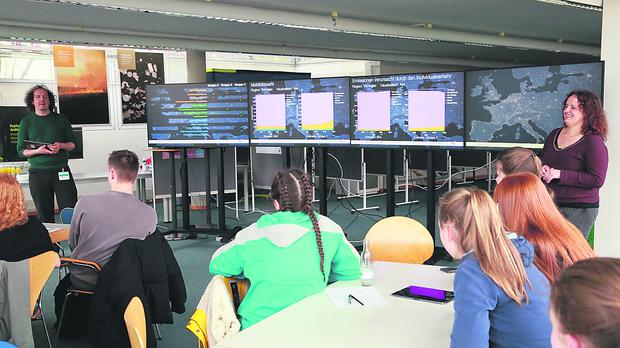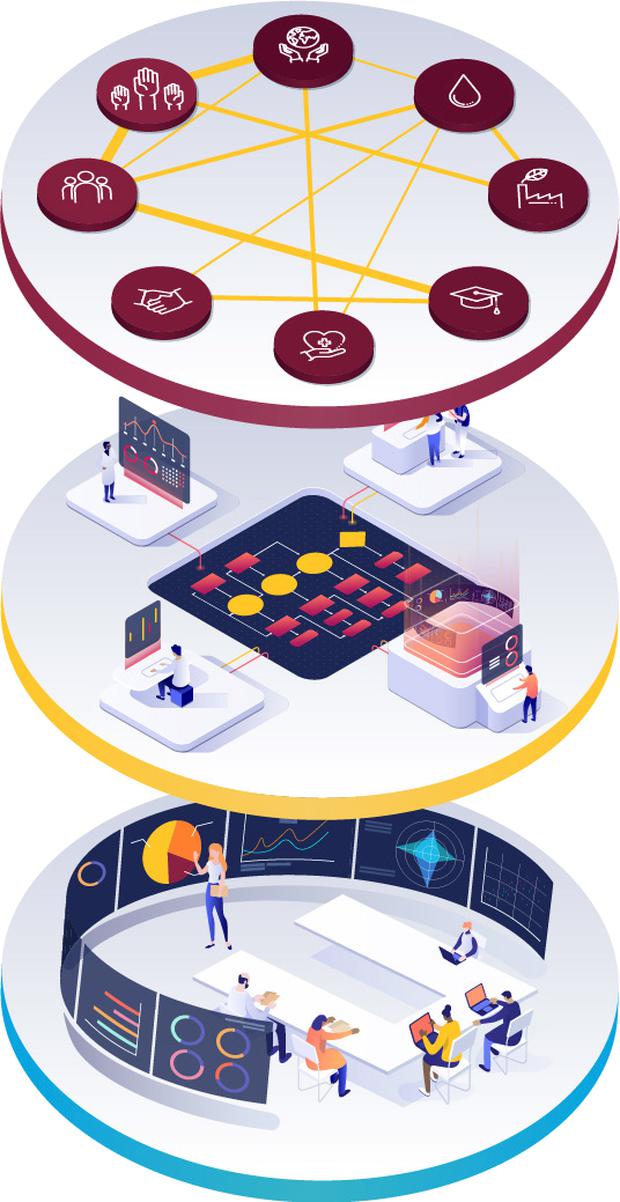
© meandering mississippi / map by harold n. fisk, u.s. army corps of engineers, 1944, geological investigation of the alluvial valley of the lower mississippi river
Science Communication today: From expert rule to collective intelligence
The world is facing enormous crises. To tackle them, scientific expertise, practical experience, and local knowledge must be combined. How can this be achieved?
Stand:
When the Spree River reached historically low water levels in 2022, while brown coal mines simultaneously fought for groundwater rights, a fundamental problem emerged: different expert opinions existed in parallel without being systematically integrated. Climate researchers understood the meteorological connections, energy experts the impacts of coal phase-out, hydrologists the groundwater dynamics – but structured spaces for bringing these perspectives together were missing. In the Anthropocene, the boundaries between our knowledge systems have become barriers to our survival. The crucial question is: How do we organize our knowledge so that actionable insights emerge from it?
Since the Enlightenment, science was increasingly divided into specialized disciplines. What began as necessary deepening led to a fragmentation of knowledge. Today, science generates more specialized knowledge than ever – but does our highly specialized science also produce the knowledge we need to cope with the Anthropocene challanges?
What we are experiencing is a crisis of our „knowledge economy“ – the entire ensemble of institutions and processes that produce and reproduce a society’s available knowledge. For the first time in history, our collective survival has become explicitly dependent on the quality of our knowledge organization. We are experiencing the emergence of what we can call „epistemic evolution“ – an epoch in which the future of human cultures has become dependent on how we develop and use scientific knowledge.
The traditional model of science communication followed a simple logic: scientists produce knowledge, communicators translate it, politicians implement it, citizens follow it. In the Anthropocene, this linear model becomes a dangerous illusion. The climate crisis demonstrates the failure: well-founded analyses of climate change risks were already available by the end of the 1960s. The scientific knowledge was there – but a systematic „war against knowledge“ by industrial interests followed. „Follow the science“ therefore cannot be our motto. Science is a collective learning process that needs social embedding, not its replacement.
In the Anthropocene, scientific findings become explicitly politically relevant.
Jürgen Renn, Science historian
What we need instead is a fundamental reorganization of the relationship between different forms of knowledge. The newly founded Max Planck Institute of Geoanthropology in Jena works on the systematic connection of orientation knowledge (where do we want to go as a society?), systems knowledge (how do complex systems work?), and transformation knowledge (how do we get from here to there?). Without orientation knowledge, society acts aimlessly, without systems knowledge it is blind, and without transformation knowledge it is subject to the „tragedy of long-term goals“ – the constant postponement of goals to be achieved into an ever more distant future.
Co-production of knowledge
The alternative to expert rule is the co-production of knowledge – processes in which scientific expertise is systematically combined with practical experience, local knowledge, and social perspectives. The project „Mississippi: An Anthropocene River“, conducted jointly with the House of World Cultures and the Max Planck Institute for the History of Science, exemplified how transdisciplinary teams of scientists, artists, and activists developed new insights along the 2,300-mile river that neither science nor practice alone could have achieved. This created transregional alliances between people dealing with related problems in different locations.
This new form of knowledge production needs suitable infrastructures. Arizona State University developed an innovative methodology with the „Decision Theater“: In specially designed rooms with multiple screens, energy planners, climate researchers, municipal politicians, and citizen representatives can play through different scenarios, linking local data with global experiences and scientific models. The crucial point is: This is not one-way knowledge transfer, but genuine co-creation. Participants can contribute local knowledge, point out missing data, and question scientific assumptions.

© MPI GEA
One of the greatest challenges is productively integrating different and often contradictory stakeholder interests. Structured deliberation processes create shared learning spaces where the abstract question „What does science say?“ becomes the concrete question: „What happens when we take different paths, and how can we shape these together?“ The Max Planck Institute for Geoanthropology is developing such approaches further and plans to expand them into a European hub for Decision Theater technology.
This transformation becomes particularly exciting through the integration of artificial intelligence. AI systems can help make experiences from different societies and climate zones useful for local decisions. An AI assistant could, during a Decision Theater session on regional energy planning, point out which solutions were successful in similar regions. This is not about automating decisions, but about creating a „web of knowledge“ in which citizens can become co-producers of insights.
Explicitly political relevant
However, it is crucial that these technologies must be democratically designed. AI systems are not neutral – they embody the values and assumptions of their developers. Without transparent governance, we risk these powerful tools reinforcing the concentration of knowledge power instead of democratizing it.

© 2019 Arizona Board of Regents
This transformation has profound implications for democracy. In the Anthropocene, scientific findings become explicitly politically relevant – but this does not mean that scientists should make political decisions. Rather, it is about developing „deliberative competence“ – the ability of societies to make informed decisions about complex, long-term problems. Decision Theater methods offer a way out here: They create spaces for informed deliberation that consider both local needs and global contexts.
In the long term, something fundamentally novel could emerge from the convergence of various innovations that we already envisioned in the early 2000s: an „epistemic web“ – a digital infrastructure fundamentally optimized for the co-production and exchange of knowledge. Unlike today’s commercially dominated internet, such an infrastructure would make citizens active knowledge producers and systematically connect local with global knowledge. With agentic AI and new protocols, this vision is becoming technically feasible today.
An evolution of our knowledge economy
These technologies – Decision Theater, AI-supported deliberation, and epistemic web architectures – are not just useful tools, but the instruments of a new knowledge economy appropriate to the Anthropocene. For the first time in history, they make it possible to systematically combine complex scientific knowledge with local expertise and democratic deliberation.
At this year’s Berlin Science Week, various approaches to this transformation will be explored. Berlin exemplifies the challenges that cities worldwide must master: How can urban development be designed to be climate-resilient? How can energy transition and social justice be combined? How can citizens become genuine partners in urban development? These questions can only be answered when scientific expertise, local knowledge, and democratic deliberation are systematically connected. Berlin thus becomes a laboratory for the future of knowledge.
In the Anthropocene, we need an evolution of our knowledge economy that is as critical for human survival as the evolution of our energy systems. The transformation has already begun. It is up to us to shape this development and ensure that 21st century science serves the survival and flourishing of humanity.